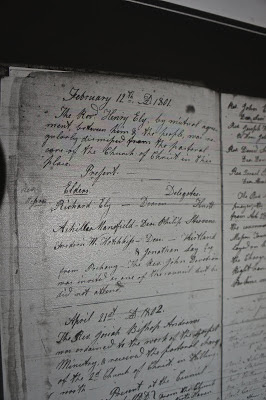In the article on Abraham Pierson’s notebook we discussed the ministers who had served in Killingworth during his tenure. We present here a few documents that relate to the Rev. Henry Ely and the Rev. Josiah B. Andrews. The first document concerns the Rev. Ely. The record notes the agreement to set his salary at 90 pounds. Raising funds to provide keep for a minister was one of the primary tasks in any Society. It seemed unimaginable to not have a minister. In town minutes you also see references to assignments and projects to build or maintain housing. Another of the needs commonly discussed was efforts to provide the minister with an adequate supply to fire wood. As we discussed earlier conflicts arose between the Rev. Ely and the Society over the amount of financial and other support he was to receive. The conflict grew to a point that they agreed to part ways. The document reads in part “The Rev. Henry Ely, by mutual agreement, between him and the people was regularly dismissed from the pastoral care of the Church of Christ in this place”. The interesting term and concept here is the idea of being “dismissed”. It is a term used with the church membership as a whole. The term was used as an acknowledgement that the parishioner was being released from his covenants with the Society in order to move to a new Society. Entry into the new Society was noted using the term “received by letter”. This process was in essence a transfer of the blessings of being in Full Communion. It seems that the idea of being unaffiliated or outside of the “watch and care” of a Society was almost unthinkable.------The third document records the ordination of the Rev. Andrews to the role of Minister. “The Reverend Josiah B. Andrews was ordained to the work of the gospel ministry and received the pastoral charge of the 2nd Church of Christ in Killingworth”. Also listed is the quorum of Ministers and Deacons who presided over the ordination. The imagery in this document highlights a religious conundrum that persists to this day. The Congregational movement was one iteration of the broader Protestant movement that had as a core belief the rejection of the Catholics Church’s concept of the need for a priestly class to intercede on our behalf with Heaven. For Congregationalists the role of intersession was filled by the congregation. Yet in their desire to be true to the scriptures and finding themselves still somewhat trapped by their Catholic past they maintained the concept of ordination, which is itself, an argument for Apostolic Succession. To reconcile the conundrum they argued that ordination was only necessary for the sake of authorization and church order. This angst over such doctrinal confusion only increased with time. One of the responses was to try to reform Congregationalism just as it had tried to reform the Anglican Church and Catholicism. Thus we see the rise of the Baptist and Methodists movements. The debates divided movements and even single Societies. It is ironic that the Killingworth Second Society today is without a minister, the result of doctrinal disagreements. These debates touched the average churchgoer and even involved the theological elites on both sides of the Atlantic. A famous example involves John Wesley. After he ordained Thomas Coke a superintendent to administer sacraments to the Methodists, his brother Charles wrote:” So easy are Bishops made, By Man’s or woman’s whim? Wesley, his hands on Coke hath laid, But who laid hands on Him?”. Click on documents to enlarge.









No comments:
Post a Comment